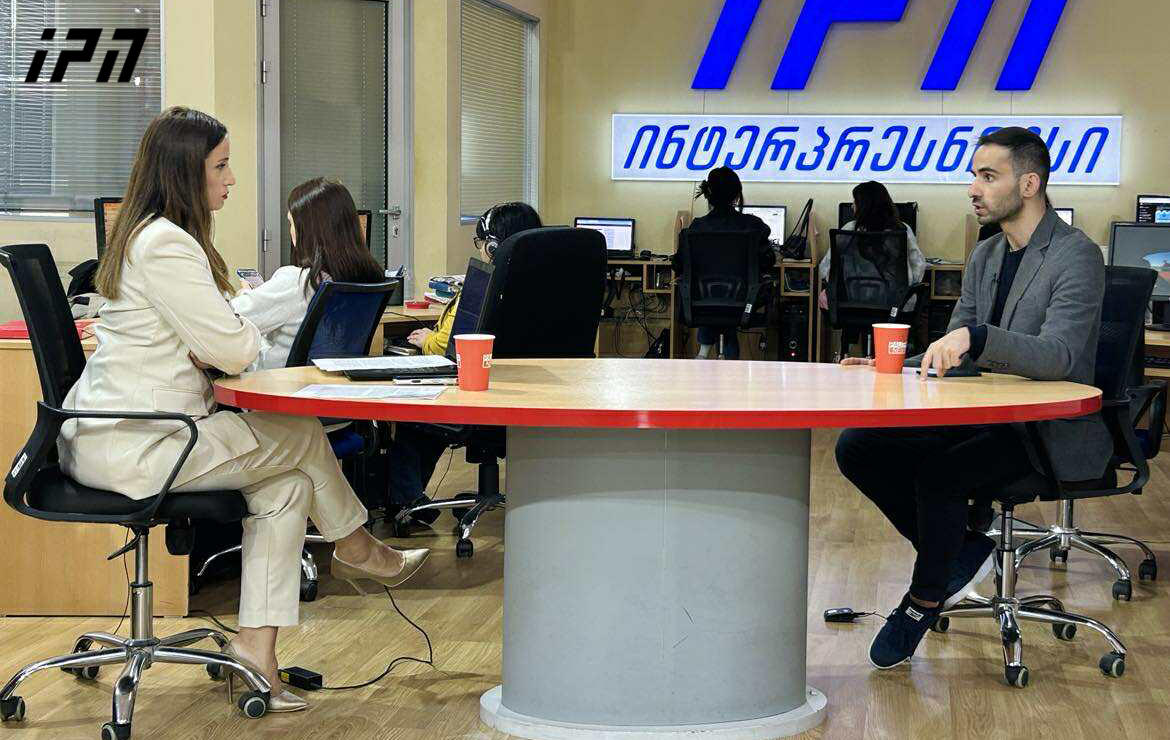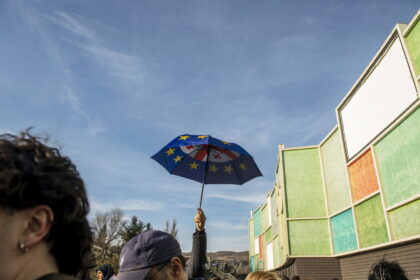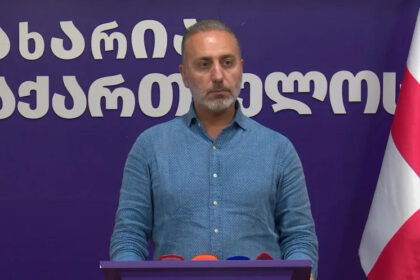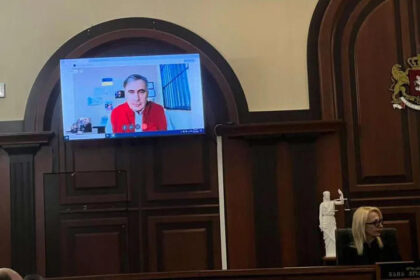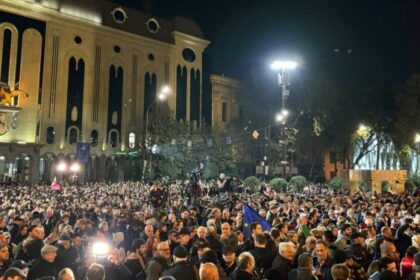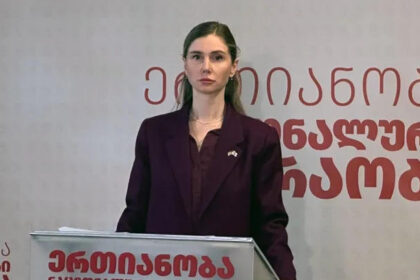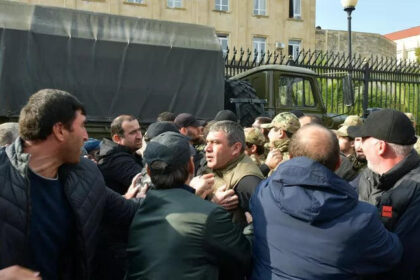“If we previously talked about how the norms of the Administrative Offenses Code were used against activists to restrict freedom of expression, now those words seem far too mild – these changes are aimed at restricting, or rather banning, any form of expression,” said Nika Simonishvili, a lawyer and former chairman of the Young Lawyers’ Association, on PalitraNews’ program “Day’s Newsroom,” commenting on the amendments announced by “Georgian Dream” to the Administrative Offenses and Criminal Codes.
According to Simonishvili, the planned changes contradict the Constitution of Georgia and the international obligations the country has undertaken.
The lawyer stated that the amendments proposed by “Georgian Dream” are analogous to provisions that existed in the Soviet Union’s Criminal Code.
“These changes introduced by ‘Georgian Dream’ contradict the Constitution of Georgia and Georgia’s international treaties. In principle, given the obligations we have under international treaties and the rights to freedom of assembly and expression guaranteed by the Constitution, these freedoms are completely stripped of their substance. If we previously talked about how the norms of the Administrative Offenses Code were used to restrict activists’ freedom of expression, now those words seem far too mild. These changes are aimed at restricting, or rather banning, any form of expression. Any expression that ‘Georgian Dream’ dislikes or finds unacceptable will simply be banned. This ban means that after administrative penalties, individuals will now face criminal sanctions.
When ‘Georgian Dream’ talks about the legality or illegality of certain actions and the rule of law, let’s start with the fact that the rule of law existed in this country even during the Soviet Union. There were rules and laws in place there too. I want to remind you that the Soviet Union’s Criminal Code had provisions analogous to what ‘Georgian Dream’ is now introducing. Formally, what ‘Georgian Dream’ is proposing constitutes a violation of the law. But whether this law is just and in line with the Constitution is the question we are raising. Papuashvili and other representatives of ‘Georgian Dream’ say that the law is being violated, but is this law just and compliant with the Constitution? Legality does not mean that these rules are legally correct or aligned with the rule of law.
‘Georgian Dream’ tells us they will arrest people for wearing masks at protests or for standing on the street. What does this have to do with justice?” Simonishvili stated.
Simonishvili also responded to a statement by Giorgi Sharashidze, one of the leaders of “For Georgia,” who noted that the legislative drafts developed by “Georgian Dream” are “the result of the October 4 special operation and the activities of irresponsible politicians,” which gave the authorities a pretext to develop stricter regulations. Commenting on this statement, Simonishvili said that “this person’s statement is more harmful and unserious than those made by ‘Georgian Dream.'”
“This is not the first change. ‘Georgian Dream’ had already stripped the freedoms of assembly and expression of their substance with previous amendments. When they imposed 5,000 GEL fines, introduced administrative detentions related to freedom of expression and assembly, was that because of October 4? Did ‘Georgian Dream’ not do this before October 4? Haven’t thousands of people been unjustly fined 5,000 GEL or subjected to administrative detentions? Haven’t thousands of political prisoners been arrested under criminal law without evidence? Did all this happen because of October 4? With such statements, they are not opposing ‘Georgian Dream’ but the society that is protesting. I don’t want to touch on other statements made within this party that directly opposed this protest. I think they will need to soften their tone a bit because they will face deserved public backlash,” Simonishvili stated.
Simonishvili also discussed other legislative packages announced by “Georgian Dream,” including planned changes that would prohibit certain individuals from engaging in party activities, holding political positions, or exercising passive electoral rights. According to Simonishvili, “what ‘Georgian Dream’ is doing goes beyond banning party activities; it is a ban on political activity.”
“It prohibits individuals from engaging in political activity, which no longer has any democratic dimension. ‘Georgian Dream’ can no longer claim to be following the best international practices of any country. This is unequivocally analogous to Russian legislation. As for the idea that after banning specific parties, ‘Georgian Dream’ will create pseudo-opposition parties or use existing ones as pseudo-opposition, I don’t know—both options can be considered. The whole point is that ‘Georgian Dream’ is saying that only those who fit within my framework can engage in political activity; only those I approve of can be in the political opposition; only those acceptable to me can engage in political activity; those I find unacceptable will simply be left outside politics. If you go out on the street, they will arrest you; if you want to enter politics, they won’t let you,” Simonishvili noted.
Regarding the legislative package that prohibits individuals convicted of certain financial and economic crimes from leaving the country until full compensation is made, Simonishvili believes that this change “condemns a person to death.”
“This is an extremely harsh escalation of a completely inhumane law. There is simply no precedent for such a law in this country. This law deprives a person of the right to leave the country. Let’s look at this as a whole. ‘Georgian Dream’ has even banned family members from helping these individuals. They will be arrested not only for providing financial assistance but even for letting them stay in their homes. You cannot help a person with more than 500 GEL. What could be more anti-human than this? You cannot leave the country, they take away your means of survival, and no one can help you with food or shelter. You are condemned to death. I don’t know how such a thing could exist in any normal country; I don’t even recall such a law in Russia,” Simonishvili stated.
Nika Simonishvili: Changes related to protests should be seen as a ban on any form of expression, and Gakharia’s party’s position is more harmful than “Georgian Dream’s” statements – They need to soften their tone!
